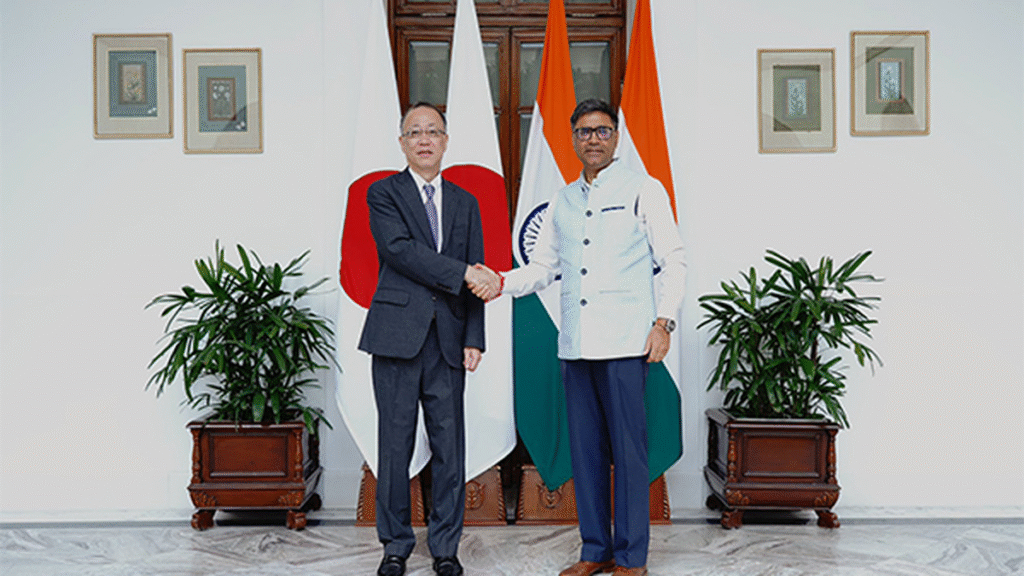
Foreign Secretary Vikram Misri meets Japanese Vice-Minister Funakoshi Takehiro. Photo Credit: X@MEAIndia
Ahead of Prime Minister Narendra Modi’s visit to Japan next month, Foreign Secretary Vikram Misri met with visiting Japanese Vice-Minister Funakoshi Takehiro in Delhi on Monday (July 28, 2025) to discuss strengthening ties, upcoming projects and smoothing out supply chain issues.
Both sides are understood to have discussed the latest developments in the Shinkansen Bullet train project to connect Ahmedabad (Sabarmati) and Mumbai, including Japan’s decision, reported by the Japan Times earlier this year, to gift India two of its latest E-10 Shinkansen trains, which will be simultaneously introduced in Japan and India.

According to the latest schedule revealed in a Parliament response by Railway Minister Ashwini Vaishnav last week, the Gujarat portion of the Mumbai-Ahmedabad High Speed Railway will be completed by December 2027, and the entire project, which was initially due to be done in 2022, is now expected to be completed by December 2029.
During his visit to Delhi, Mr. Funakoshi also met with P.K. Mishra, Principal Secretary to the Prime Minister, to discuss Mr. Modi’s travel plans.
“The dialogue was instrumental in reviewing progress in various dimensions of our ties, exploring new areas of collaboration and contributing to further deepening the bonds of friendship and cooperation between India and Japan,” said the Ministry of External Affairs in a statement, adding that Mr. Misri and Mr. Funakoshi discussed “political ties, defence and security, economic security, trade and investment, infrastructure cooperation, technology and people-to-people exchanges” during talks at Hyderabad House.
In addition, officials on both sides have been discussing problems with the shortage of critical minerals required for batteries and rare earth magnets for Battery Electric Vehicles produced by Japanese manufacturers due to export restrictions from China. According to sources, companies such as Suzuki and Toyota have been particularly affected, as they factor in the lower cost of Chinese materials required for EV cars manufactured in India. In the long term, the sources said that India and Japan are considering collaborations for the development of rare earth materials here and other third countries like Vietnam.
India and Japan hold annual bilateral summits, a practice that was derailed in 2024 due to elections in both countries and conflicting schedules, and the visit has been put off a few times until now. While a date for Mr. Modi’s visit to Japan is yet to be announced, it is expected to be held in the second half of August. He is also expected to travel to China for the Shanghai Cooperation Organisation (SCO) summit on August 31-September 1, although officials did not confirm whether the two visits would be combined or separate.
“With an eye on Prime Minister Modi’s visit to Japan scheduled within this year, the two sides confirmed that Japan and India will strengthen bilateral relations in a wide range of areas such as security, economy and people-to-people exchanges,” a Japanese Ministry of Foreign Affairs statement said. “They also confirmed that both countries will further cooperate with each other, including within the framework of Quad [Japan-Australia-India-U.S.] to realise a “free and open Indo-Pacific”, it added.

Japanese Prime Minister Shigeru Ishiba is also expected to visit India for the Quad Summit, along with U.S. President Donald Trump and Australian Prime Minister Anthony Albanese, later this year, possibly in mid-November.
“During the dialogue, Foreign Secretary and his counterpart reaffirmed the growing importance of the India-Japan Special Strategic and Global Partnership for peace, prosperity and stability in the Indo-Pacific region and beyond,” the MEA statement said.
(with inputs from Maitri Porecha)
Published – July 28, 2025 11:38 pm IST

